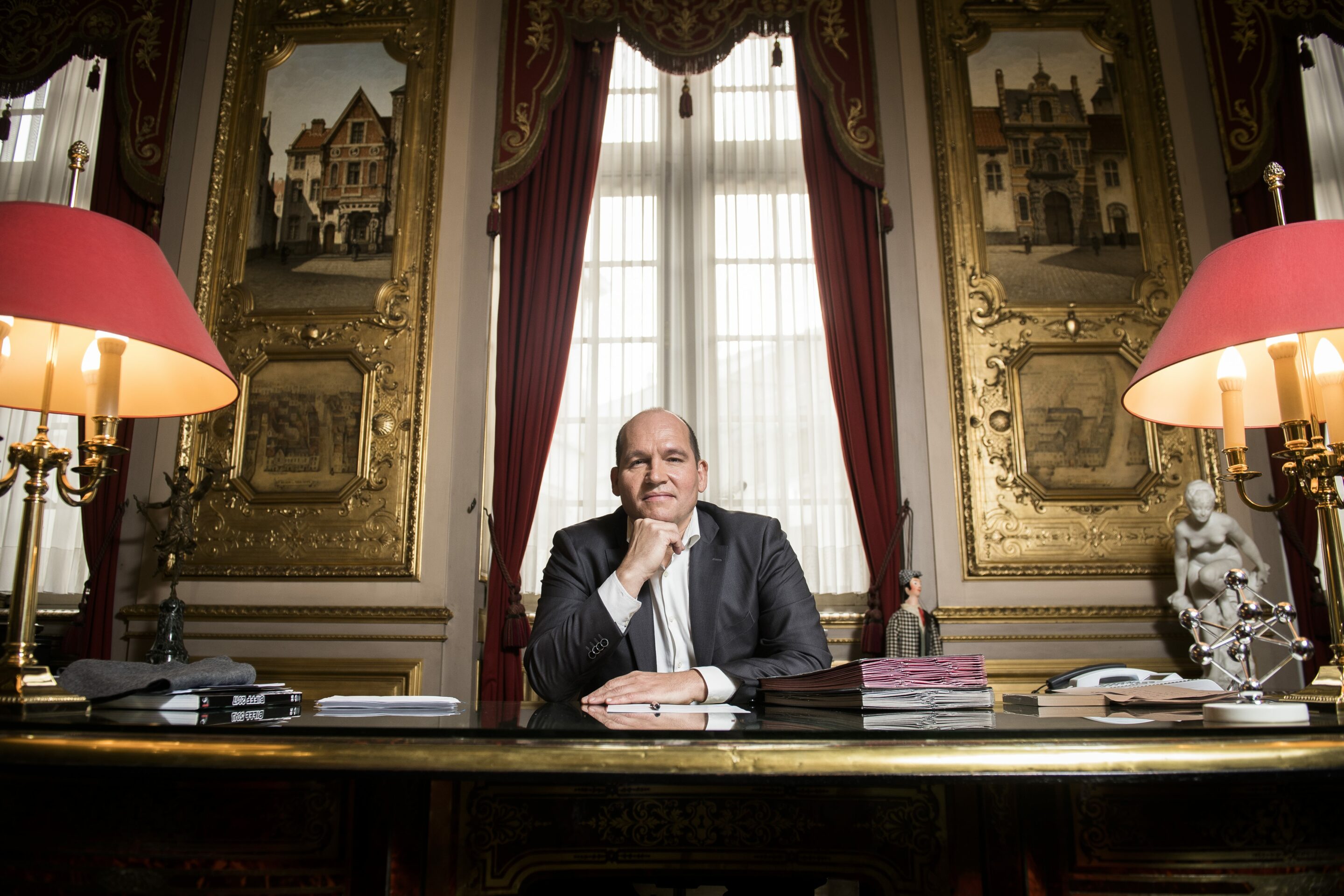As Mayor of the City of Brussels, the span of duties assigned to Philippe Close is vast. On one wall, the burly rugby enthusiast is pictured in traditional attire presiding over the Meyboom celebrations, beaming as he hefts the fresh-felled tree. But alongside the many ceremonies that he attends, Close is also the first to know when Brussels faces an emergency.
Speaking on a sunny Friday evening as terraces fill with thirsty punters, the Mayor is distracted by updates from the head of police, who have closed down Saint-Géry following reports of a man with a gun.
His phone buzzes updates every few minutes but Close stays calm and tells me it’s thought to be a hoax. Presently, a call confirms that the suspect – spotted on a roof with a weapon – had been apprehended with an air gun. In his seven years overseeing the city, Close has grown used to urgent interventions by security forces. And though many threats come to nothing, a minority have deadly consequences, as when two Swedish football fans were killed last October. In an era of terrorism, public safety is no longer something world capitals can take lightly.
Crises notwithstanding, Close has an obvious passion for his job. Sitting in a gleaming new building with an unbeatable view over the city centre, he outlines his mission to make Brussels work – for those who call it home as for those just passing through. It’s a role that puts him at the centre of local affairs. “Even when it’s not my responsibility, I take responsibility. My job is to find solutions,” Close affirms. He lists the many institutions this might involve: the Federal Government, regional governments, the police, the EU institutions… “I’m in touch with everyone. Everyone can come to me.”
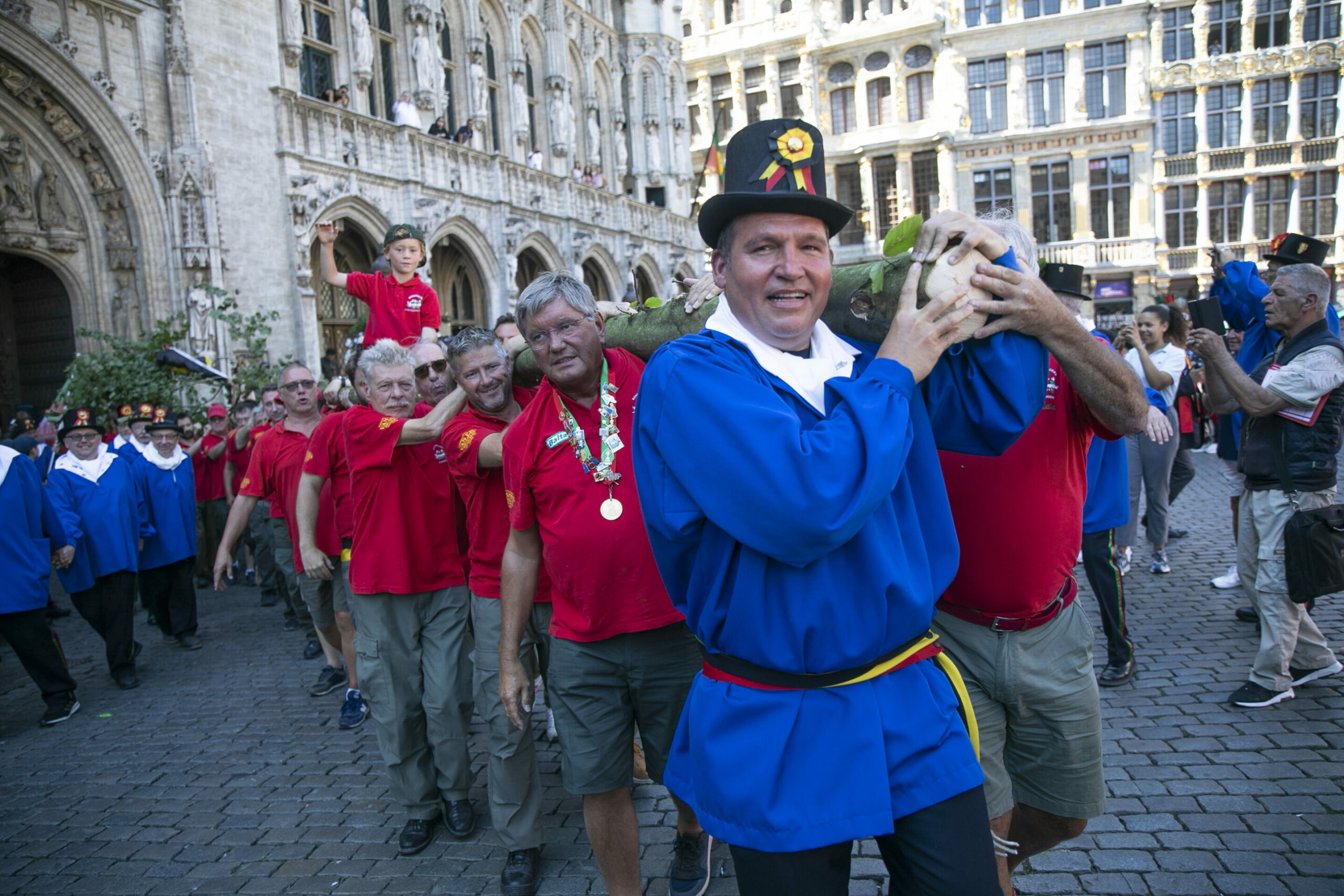
Close during the August 2022 Meyboom festivities, a highly colourful parade in which a tree is brought to Brussels, featuring giants and people in folk dress. Credit: Belga / Hatim Kaghat
Despite a strong desire to be a competent fixer of all issues related to the City of Brussels, the dispersal of executive power from the national to local level inevitably dilutes his ability to resolve a burning problem, no matter how obvious the solution might seem to him. Still, it’s a refreshing change from the tendency for politicians to explain why they are not accountable for complications and shift the blame elsewhere. This is a recurring frustration for residents, who care less for who holds high office than for what they do when there.
But when times are good Brussels becomes the object of an ideological contest between Belgium’s north and south. Whilst the capital is an autonomous region, it is the seat of both the Walloon-Brussels Federation (which governs Belgium’s French Community) and the Flemish Government.
If Flemish nationalists had things their way Brussels would be absorbed by the Flanders region. But though the city was majority Dutch-speaking a century ago, the idea that Brussels would succumb to regional populism seems strange today given the strikingly multinational composition. Diversity and Brussels go hand in hand.
Changing the conversation on drugs
Whilst Close may not be the executive authority on all Brussels developments, he is keen to highlight projects that have come to fruition under his mayoral impetus. He cites the opening of a safe space for drug consumption. Now operational for two years, it provides a social approach to drugs.
This comes in the context of the drug problems affecting the country that have brought turf wars to some Brussels neighbourhoods. Close is clear on the need for a concerted federal strategy to dismantle trafficking networks but sees the “war on drugs” as part of a broader societal picture. “Talking about the drug issue without looking at public health makes no sense.”
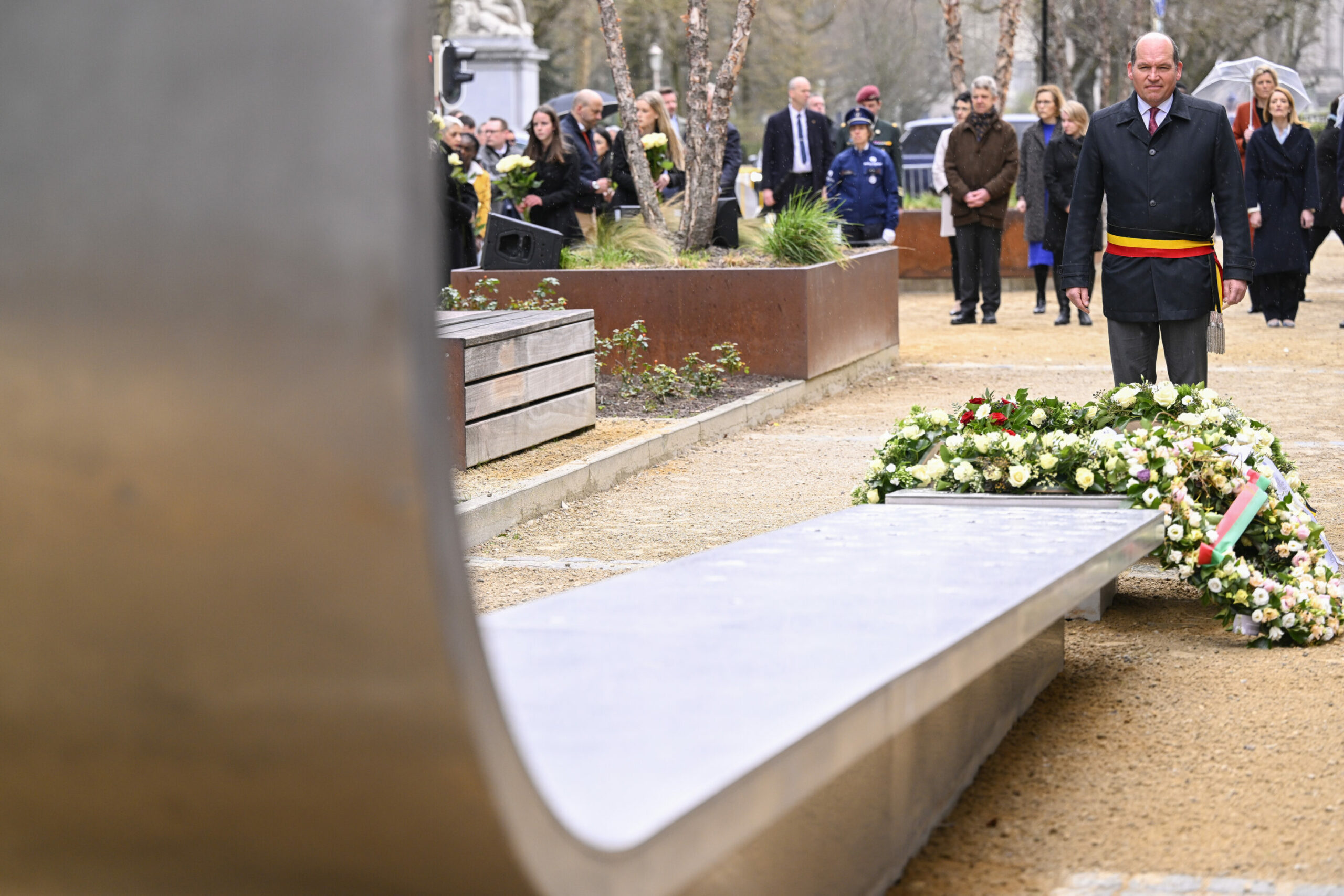
Close during a ceremony at the memorial to victims of the 2016 terrorist attacks in Brussels, March 2023. Credit: Belga. Laurie Dieffembacq
As a member of Belgium’s Socialist Party, Close advocates legalising cannabis and maintains that “the worst political stance is to not take a problem seriously.” He questions why people take drugs and says it’s absurd to treat all users the same: “They have different effects and are used in different contexts.” His humane attitude resonates with many of the capital’s residents, who recognise the need to rethink Belgium’s drug laws, which have changed little in over a century.
To illustrate how issues of drug use, public welfare, and related violence could be treated more effectively, Close highlights the successes of Belgium’s strong healthcare system: “I was a big smoker, I smoked two packs of cigarettes per day. It was thanks to the health system that I stopped (now for 10 years). Why can’t we do the same with cannabis? It is currently a criminal offence to smoke it but in reality it’s not something we penalise. This is incoherent, and the justice system knows it. At the same time we allow the network of traffickers to grow… I hope the next legislature will vote on it (legalising cannabis ed.note), I think it would probably pass.”
The inter-regional zero-sum game
As well as recognising the healthcare sector, Close celebrates the public services that keep Brussels moving. The long campaign to direct cars away from the city centre has transformed boulevards that once heaved with traffic. But the overhaul required alternative mobility options to rejuvenate an evolving urban space. On this front, the Mayor evangelises about STIB (the public transport provider), which he holds up as an example of a public company functioning well.
Not only is the network is key to the Capital Region’s daily affairs, it brings economic prosperity to Belgium more widely. Close points to the hundreds of thousands of non-Brussels residents who also rely on the service, which also accounts for the largest portion of regional spending. “I spend a lot of time persuading Flanders and Wallonia that investing in STIB benefits everyone.” In light of this, the inter-regional disputes about transport funding are unhelpful. Indeed, the tit-for-tat disputes that often have regions at loggerheads simply aren’t in the national interest.
To make his point, the Mayor imagines a growing company that relocates from Brussels to Wallonia or Flanders. In his view this is an indisputable success story but one that some factions would frame as a win for one region and a loss for the other. “Let’s stop the idiotic competition between regions, we should instead be helping each other and recognising that what’s good for one is good for all.” Again, the will to rise above party politics is in evidence as Close champions the dynamism that makes the city thrive.
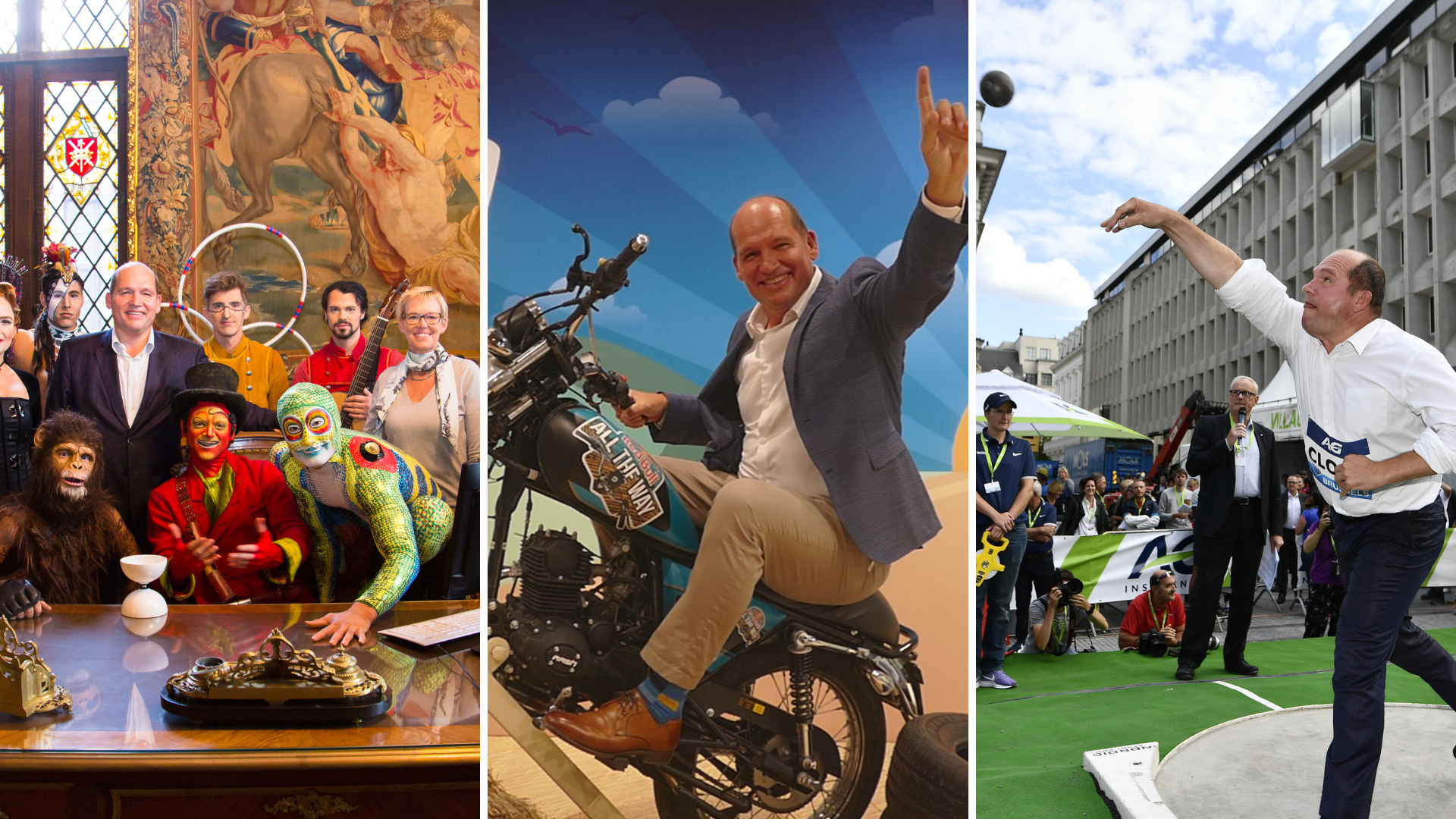
Never a dull moment: Close clearly thrills in his job, with no day quite the same. Credit: Belga
Tapping into expat potential
It’s not just effective public services that help Brussels flourish – it’s also about the people in the city. Close appreciates the energy that comes with being “most cosmopolitan city in the world”, going so far as to say that expats are some of the most committed residents. He describes how they moved into areas of Brussels that until recently were looked down upon by affluent Belgians. “55,000 people have moved to Brussels in 20 years – many from abroad.”
The Mayor is pleased with his city’s popularity but there’s a note of frustration as he laments that just 16% of expats participate in local elections: “Many think that they will eventually move back to their home country but they make up two thirds of the population! It’s their city and my job is to engage them in the decision-making process.”
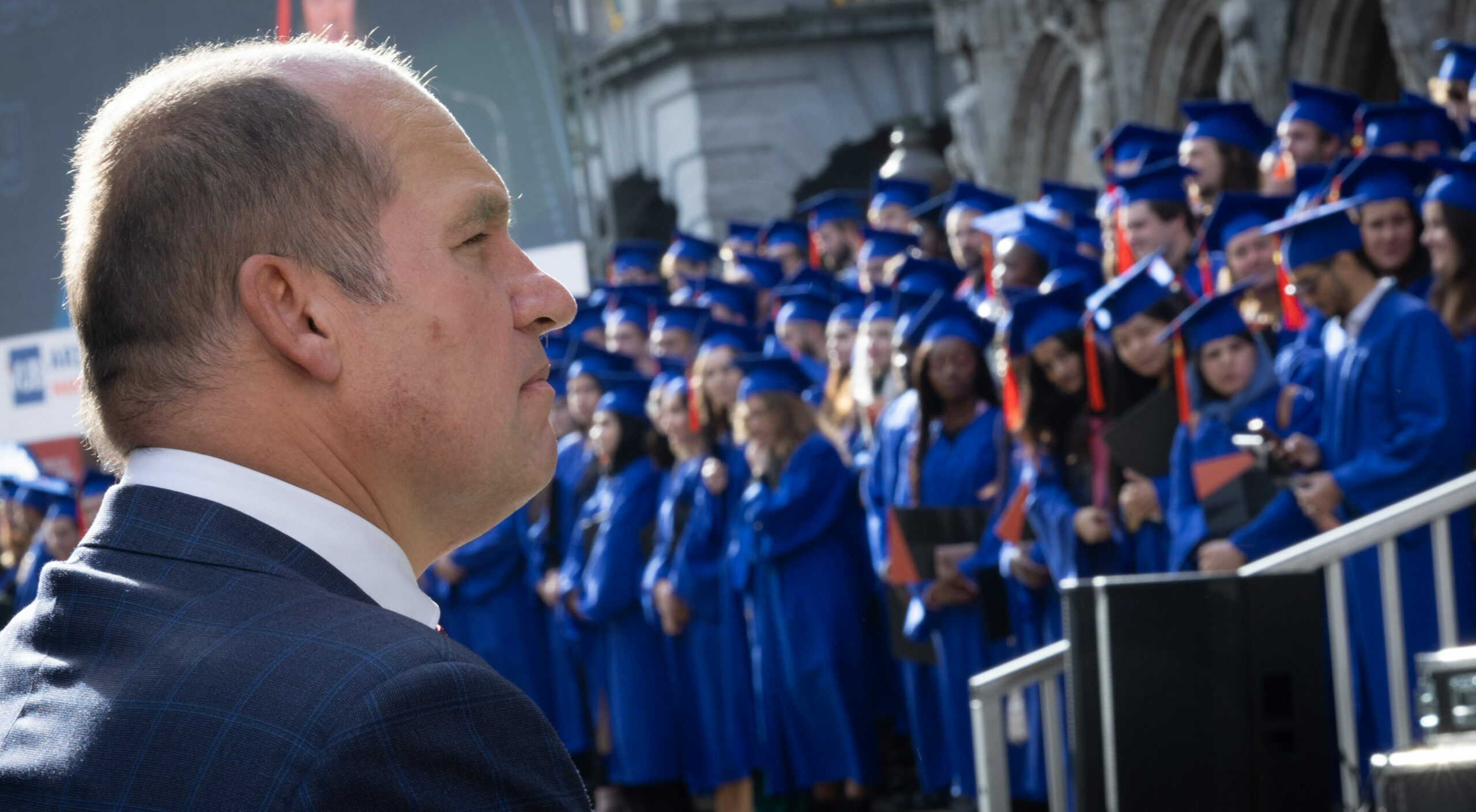
Close at the graduation ceremony for students of the VUB and ULB universities, Brussels Grand Place, October 2022. Credit: Belga / Benoit Doppagne
As well as the expats, Close sees potential in the younger generations and believes Brussels must become a “smart city” through greater investment in the city’s higher education institutions, which collectively welcome some 100,000 students. “We don’t spend nearly enough on education. We need to become a hub for research and sharing knowledge. We should pull out all the stops to nurture this sector and make Brussels a booming global capital.”
Hand in hand with cultivating young minds, the tourism that Brussels attracts also presents an opportunity. Close highlights the value of business tourism, which not only generates more revenue but comes with less disturbance, whether through rowdy lager louts or throngs of bumbling sightseers. “It also feeds into the idea of Brussels as a city of knowledge and research.”
Aside from promoting the city’s business attributes and significance to Belgium’s economy more broadly, Close takes pride in Brussels after-hours and isn’t shy to let his hair down. Figuratively speaking. Not only does the Mayor sign off demonstrations or summits that occupy the public space, he actively pushes for special events in unusual occasions.
As a vocal proponent of the arts he has been instrumental in occasions such as a rave in the tunnels of the inner road ring. “Brussels must cherish the spaces that gives it life,” he stresses, again stating his support for Fuse nightclub, which last year was threatened with closure due to noise complaints.
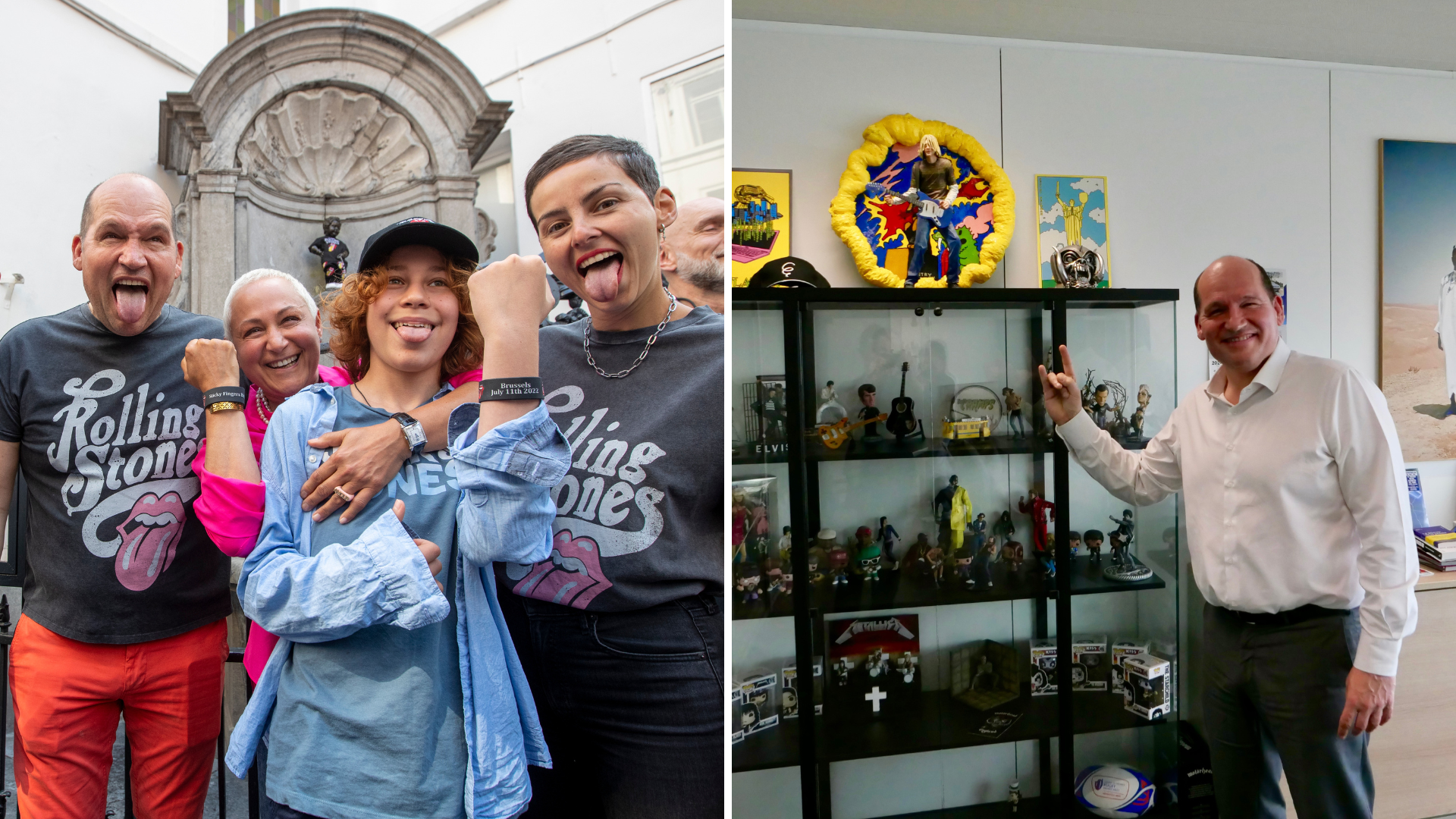
"Rock is coming around after being boring for a bit." A dedicated concert-goer, Close champions art and events around the city. Credit: Belga / Orlando Whitehead
The Mayor motions to a cabinet filled with rock star figurines. “My wife wouldn’t let me have them at home,” he grins. Metal is his first love and Lemmy from Motorhead has pride of place, though Close is complementary about the rap that he has discovered thanks to his teenage sons. “I love the night. There’s nothing better than the act of communion that comes when a crowd unites in song. People’s differences dissolve.”
Ultimately, Close is sceptical of any individual or political group that wishes to assert its hold over the city. Strident on issues of inclusivity and tolerance, he understands that it is precisely because of the 184 nationalities living here, the creeds and cultures they bring, that Brussels is the vibrant space open to all. Perfect it is not, but precious it most certainly is.

